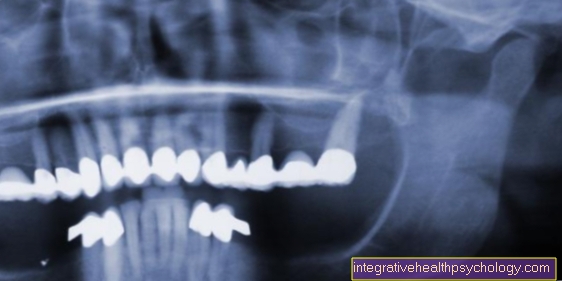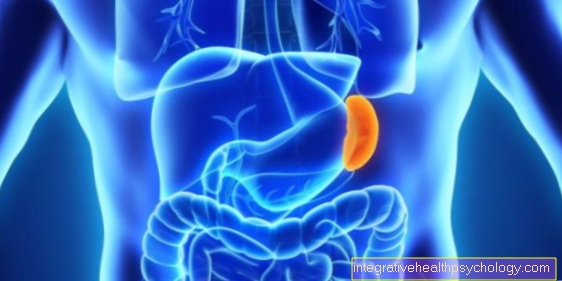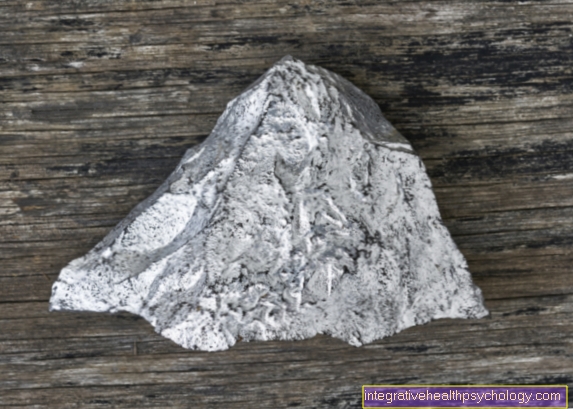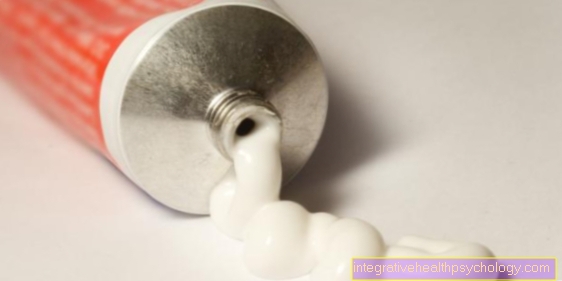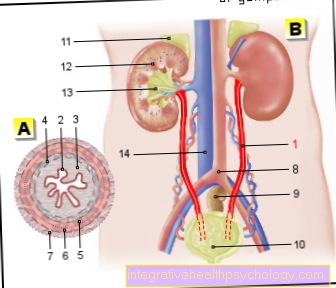Chronic renal failure
introduction
Chronic kidney failure is a serious illness that affects the organ system of the kidneys. The kidneys fulfill a number of important and essential tasks in the human body without which humans could not survive. With chronic renal failure, this important organ system is damaged. Renal insufficiency is defined from a kidney function performance of 15% or less compared to the norm.
The kidneys intervene in many different systems in the body. In addition to regulating the acid-base balance and controlling the electrolyte concentration, the kidneys take on a filter function in the body. The blood is filtered and certain substances are excreted in the urine. These substances, urea, creatinine and uric acid in particular, increase in concentration in the body due to the poor kidney performance in chronic kidney failure and can only be removed from the body by a transplant of a healthy kidney or an artificial kidney replacement (dialysis).
Read more about this under Renal failure and Functions of the kidney

causes
The causes for the development of chronic kidney failure are diverse. In order to be able to better organize the prophylaxis before the onset of the disease, research on the causes behind the development of chronic kidney failure has been pushed forward strongly in recent years. With the help of intensive research, it has been found that certain diseases are particularly often associated with the development of chronic kidney failure.
So it is estimated that at around 30% of those who have had a previous chronic kidney failure Diabetes mellitus was the cause. Also the high blood pressure is considered a risk factor for the development of chronic kidney failure. Also can inflammatory diseases of the kidneys such as Autoimmune diseases be responsible for the development of chronic kidney failure.
At about 10% of people suffering from renal insufficiency chronically ill are can never mind for the development of the disease can be found.
Symptoms
The kidneys fulfill a number of important tasks in the body, which intervene in a wide variety of systems. So it is clear that a dysfunction of the kidneys can cause a variety of symptoms that are caused by the deterioration in the performance of the organ system. As the disease progresses, symptoms typically increase in both intensity and number. So are initially unspecific symptoms such as headaches and poor concentration typical.
The disease is usually noticeable through Water retention in the legs or face. Disorders of the Water and electrolyte balance reflect the influence of the kidney on these systems in the body. Also the Acid-base balance is influenced by the kidneys, which is why chronic kidney failure, if not treated, can lead to metabolic disorders of this system Acidosis can come. An increased one is also particularly common Itching of the skin. The skin may also appear slightly yellow and it may develop Urine smell to make noticable.
If the kidneys are not able to function properly for a longer period of time, there are changes in the skeletal structure, which in turn leads to increased changes Tendency to fracture. A striking one Bad breath as well as the occasional Vomit or nausea are also symptoms of kidney failure.
Stages of chronic renal failure
There are different Stages of renal failure is classified differently. There are different ways of classification that can be used to classify chronic kidney failure. Chronic renal insufficiency can on the one hand after the so-called glomerular filtration rate (GFR) as well as the so-called Retention values to be grouped.
The glomerular filtration rate is the value most commonly used for kidney function. With this value, the individual function of the kidney can be assessed particularly well. A doctor can use the GFR and compare it with normal values to determine whether chronic kidney failure is present.
The glomerular filtration rate is a parameter that can describe the performance of the kidney. The individual glomerular filtration rate depends on how much volume can be filtered by the kidneys within a defined time. In the case of chronic kidney failure, this is as GFR designated size very low. If there is a GFR of under 15 before, it is officially referred to as chronic kidney failure, while values over 90 for one normal kidney function speak.However, it is normal for the GFR to decrease in the course of life, which is why it is not necessarily a disease that is behind low GFR values.
The so-called are also used for classification Retention values. These allow chronic kidney failure itself to be divided into four different stages. Chronic kidney failure is classified according to the level of substances in the body that are normally filtered out by the kidneys.
Stage 1
Stage 1 of chronic kidney failure is called a compensated insufficiency the kidneys. It can indeed be established that there is a limitation in the functional performance of the kidneys Retention values however, are in Normal range and there are no symptoms available.
In stage 1 of chronic kidney failure, the body can still compensate for the lack of kidney function and symptoms that would be associated with increased retention values do not appear. The determination of the retention values in the blood is particularly important when assessing whether a stage 1 or already a stage 2 is present.
Exceeds the so-called Creatinine the normal value in the blood must of at least stage 2 can be assumed, while with normal creatinine levels a stage 1 of chronic kidney failure is likely.
Typical Symptoms of Renal Failure such as water retention /Edema on the legs or on the face, a Pulmonary edema or Cardiac arrhythmias are at this stage Not in front.
Stage 2
Stage 2 is defined as the Blood values increased are the Symptoms chronic renal failure, however fail.
The substances that the kidney normally filters out of the blood and excreted in the urine accumulate in the blood in chronic kidney failure. In particular, the so-called creatinine is examined, which can be used as a reference for the substances to be filtered out.
In stage 2 of chronic kidney failure, this is present in the blood Creatinine compared to the norm elevated. However, the concentration does not exceed values that are associated with typical symptoms of chronic kidney failure. People with chronic kidney failure stage 2 suffer Not on classic symptoms the condition such as water retention or electrolyte disorders.
Stage 3
The situation is different with stage 3, which is with increased retention values in the blood and striking symptoms goes hand in hand. When examining the blood of a person suffering from chronic renal insufficiency in stage 3, a significant increase in the retention values can be determined.
In addition to a change in the values in the blood due to the insufficient filter function of the kidneys, stage 3 first time symptoms chronic renal failure. At first, unspecific symptoms such as a headache and Difficulty concentrating which in many cases are not associated with renal insufficiency.
If Water retention On the legs or face as well as skin symptoms and disorders of the water and electrolyte balance occur, the diagnosis of chronic kidney failure in stage 3 is made quickly. In contrast to stage 4 of the disease, there is still no talk of terminal kidney dysfunction. In stage 3 of the disease, procedures such as dialysis and a kidney transplant are not yet necessary.
Stage 4
In stage 4, the symptoms of the disease are so advanced that from a end stage renal disease the speech is. A treatment by a Dialysis therapy is necessary and a transplantation kidney may need to be considered.
The Substances in the bloodwhich are normally excreted by the kidneys in the urine are at this stage massively increased and functional performance usually produces severe and debilitating symptoms. Particularly water retention in the lungs (Pulmonary edema) and a Anemia, as well as severe disturbances of the water and electrolyte balance are classic symptoms of chronic kidney failure in stage 4.
Regular dialysis treatments are life-sustaining measures which are necessary in stage 4. A Kidney transplant represents in many cases the the only option to get away from the annoying symptoms and dialysis therapy, whereby not every patient suffering from chronic renal insufficiency in stage 4 is assigned a new kidney. Since significantly more kidneys are needed than are available, donor kidneys are assigned centrally.
Life expectancy
Chronic renal failure can be divided into different stages. Sometimes it is possible through a targeted treatment as well as a Diet change stop the progression of the insufficiency. Untreated however, the disease almost always has one progressive course which ends in stage 4, terminal renal failure.
In terminal renal failure, the Dialysis therapy necessary as a life support measure. Without this therapy, the organism would no longer be able to compensate for the weak functioning of the kidneys and the affected person would die. A transplantation kidney can usually improve the life expectancy of the affected person significantly.
Still that remains Life expectancy during dialysis therapy, as well as after a new kidney transplant degraded. This is due to a number of different factors. For one, the risk of serious infection greatly increased when dialysis therapy is carried out continuously. Complications can also arise when transplanting the new organ. Finally, people who suffer from chronic kidney failure stage 4 also frequently suffer from diseases which in turn are associated with a reduced life expectancy. Especially the presence of diseases like the coronary artery disease (CHD), one Heart failure or one Expansion of the left ventricle (left ventricular hypertrophy) are reasons that affected people have a shorter life expectancy.
nutrition
Diet plays a crucial role both in preventing chronic kidney failure and in treating the condition.
In the prevention of chronic renal failure, the emergence of a Diabetes mellitus as well as developing a High blood pressure can be prevented by proper diet. Physical activity also plays a major role.
Proper nutrition is also an important part of therapy in the treatment of chronic kidney failure. So care should be taken to have a low-salt diet to be observed so as not to further damage the function of the kidneys. Also should be on a No protein, potassium or calcium-rich diet become. The treating nephrologist, a specialist in kidney diseases, and a nutritionist can give tips on how the diet plan should be designed in the case of existing kidney insufficiency in order to ensure the best possible success of the treatment.








.jpg)


